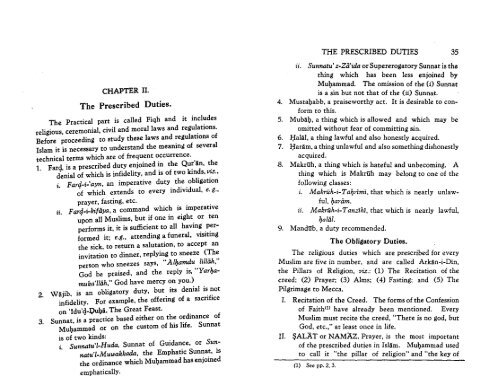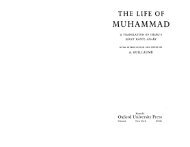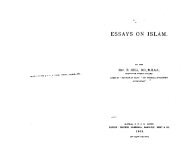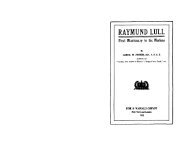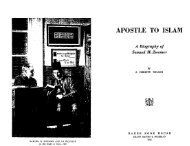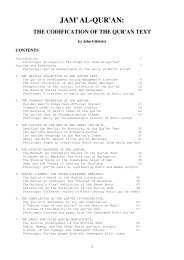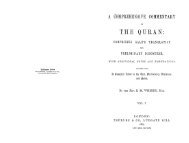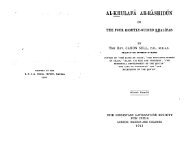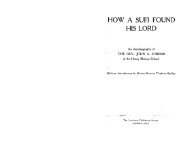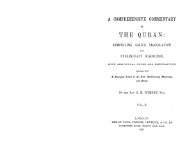Islam Its Belief and Practices - Radical Truth
Islam Its Belief and Practices - Radical Truth
Islam Its Belief and Practices - Radical Truth
Create successful ePaper yourself
Turn your PDF publications into a flip-book with our unique Google optimized e-Paper software.
THE PRESCRIBED DUTIES 35<br />
CHAPTER II.<br />
The Prescribed Duties.<br />
The Practical part is called Fiqh <strong>and</strong> it includes<br />
religious, ceremonial, civil <strong>and</strong> moral laws <strong>and</strong> regul~tions.<br />
Before proceeding to study these laws <strong>and</strong> regulatIOns of<br />
<strong>Islam</strong> it is necessary to underst<strong>and</strong> the meaninll of several<br />
technical terms which are of frequent occurrence.<br />
1. Fard, is a prescribed duty enjoined in the Qu:'an, t~e<br />
d· nial of which is infidelity, <strong>and</strong> is of two kinds, vtz.,<br />
e bl' .<br />
i. Fard-i-'ayn, an imperative duty the 0 IgatIOn<br />
~f which extends to every individual, e. g.,<br />
prayer, fasting, etc. .<br />
ii. Fard-i-kifaya, a comm<strong>and</strong> which is imperatIve<br />
dpon all Muslims, but if one in eight. or ten<br />
performs it, it is sufficient to all havm~ .p.erformed<br />
it; e.g.. attending a funeral, VlSltmg<br />
the sick, to return a salutation, to accept an<br />
invitation to dinner, replying to sneeze (The<br />
person who sneezes says, "All;uundu Zillah,"<br />
God be praised, <strong>and</strong> the reply is, ''YarQamuka'llah,"<br />
God have mercy on you.)<br />
Wajib, is an obligatory duty, but its denial i\~ot<br />
2. infidelity. For example, the offering of a sacrt Ice<br />
on 'Idu'g-J;>u1J.ii, The Great Feast. .<br />
t is a practice based either on the ordmance of<br />
3. Sunna, fh' Iii S t<br />
Muhammad or on the custom 0 IS e. unna<br />
is of twO kinds:<br />
i. Sunnatu'l-Huda, Sunnat of Guidance, or Su~natu'Z-Muwakkada,<br />
the Emphatic Sunnat, IS<br />
the ordinance which Mul}ammad has enjoined<br />
emphatically.<br />
ii. Sunnatu' z-Za'ida orSupererogatory Sunnat is the<br />
thing which has been less enjoined by<br />
Mul;1ammad. The omission of the (i) Sunnat<br />
is a sin but not that of the (ii) Sunnat.<br />
4. Mustal;1abb, a praiseworthy act. It is desirable to conform<br />
to this.<br />
5. Mubal;1, athing which is allowed <strong>and</strong> which may be<br />
o.<br />
omitted without fear of committing sin.<br />
J:ialal, a thing lawful <strong>and</strong> also honestly acquired.<br />
7. J:iaram, a thing unlawful <strong>and</strong> also something dishonestly<br />
acquired.<br />
8. Makruh, a thing which is hateful <strong>and</strong> unbecoming. A<br />
thing which is Makruh may belong to one of the<br />
following classes:<br />
,. Makmh-i-Ta1}rirni, that which is nearly unlawful,<br />
1}ararn.<br />
ii. Makmh-i-Tanzihi, that which is nearly lawful,<br />
1}alal.<br />
9. M<strong>and</strong>ub, a duty recommended.<br />
The Obligatory Duties,<br />
The religious duties which are prescribed for every<br />
Muslim are five in number, <strong>and</strong> are called Arkan-i-Din,<br />
the Pillars of Religion, viz.: (1) The Recitation of the<br />
creed; (2) Prayer; (3) Alms; (4) Fasting; <strong>and</strong> (5) The<br />
Pilgrimage to Mecca.<br />
I. Recitation of the Creed. The forms of the Confession<br />
of Faith(l) have alreadY been mentioned. Every<br />
Muslim must recite the creed, "There is no god, but<br />
God, etc.," at least once in life.<br />
II. ~ALAT or NAMAz, Prayer, is the most important<br />
of the prescribed duties in <strong>Islam</strong>. Mul;1ammad used<br />
to call it "the pillar of religion" <strong>and</strong> "the key of<br />
(1) See pp. 2, 3.


